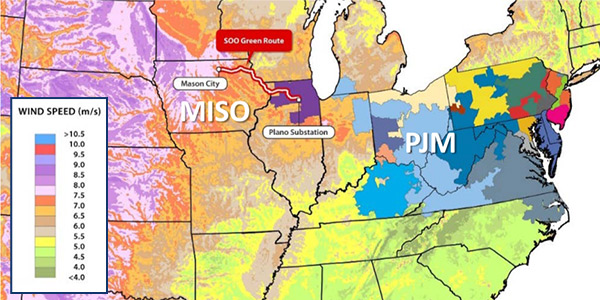PJM stakeholders agreed Thursday to consider integrating HVDC converters as a new type of capacity resource in the RTO.
An issue charge by Direct Connect Development was endorsed by the Markets and Reliability Committee with a sector-weighted vote of 4.4 (88%), well above the 50% threshold.
Steve Frenkel, vice president of Direct Connect, presented the issue charge and problem statement, which seek to establish HVDC converter stations’ eligibility to participate in the capacity market.
Winning such a change would allow Direct Connect’s SOO Green HVDC Link — a 350-mile, 2,100-MW, 525-kV underground transmission line that would deliver renewable energy from upper MISO to Illinois and the PJM grid — to compete in the market.
“SOO Green is a merchant, non-cost-allocated project that is using innovative technology and commercial structures to match buyers and sellers,” Frenkel said.
The Project
Direct Connect is planning to install the SOO Green line underground primarily along existing rail rights of way from Mason City, Iowa, to Plano, Ill., which Frenkel said would be the first major transmission project crossing the MISO-PJM seam. Construction is expected to begin in early 2022 and be completed by 2024.
Frenkel said the converter station will be directly connected to the PJM system and able to follow dispatch instructions and deliver energy on demand from a portfolio of “firm” generation supply, mostly wind turbines.
The PJM Tariff currently does not allow HVDC converters to participate in the Reliability Pricing Model market, which presents a market barrier to merchant resources seeking to sell bundled energy and capacity, he said.
While the converter station will be an internal resource within PJM able to offer comparable performance and services to other resources, Frenkel said, the RTO’s current rules do not recognize HVDC converter stations as a capacity resource.
Opposition
Calpine’s David “Scarp” Scarpignato said he was in favor of seeing the line built, but he said his company had concerns about taking on another issue charge with the amount of work already being done in the stakeholder process.
Scarp said he understood there are issues that need to be addressed, but in the HVDC issue, he said Calpine came to the “firm conclusion” that there was no problem that needed to be addressed. He said SOO Green can participate in the market through current processes, and the generators behind the line could also participate by following existing processes through pseudo-tie rules.
“We’re breaking apart the current paradigm if you do this,” Scarp said.
Frenkel said the existing Tariff does not address the market innovation his company is proposing.
“We’d appreciate the members be willing to have a conversation about how this technology can participate in the market,” Frenkel said.
Paul Sotkiewicz of E-Cubed Policy Associates, representing Elwood Energy, said the HVDC issue didn’t seem like a high-priority item to discuss. He agreed with Calpine’s assertion that there were no obstacles to SOO Green’s participation that weren’t already addressed in the Tariff.
Sotkiewicz said all stakeholders should be able to bring issues they see as problematic up for discussion. But he said the problem statement and issue charge for SOO Green was a “single company” issue.
“What I worry about is now this sets a precedent that allows all of us the ability to bring a very specific, focused issue charge to the membership,” Sotkiewicz said. “If we all did, I worry that we’d completely flood the stakeholder process and simply paralyze it and really get so far down in the weeds we can’t even see.”
Frenkel said it is a “resource class” issue.
“While SOO Green may be the first project to cross the transom and rise to the level of attention of stakeholders, we don’t see this as a single proposal,” Frenkel said. “It’s really about opening up an opportunity for a class of innovative resources.”




